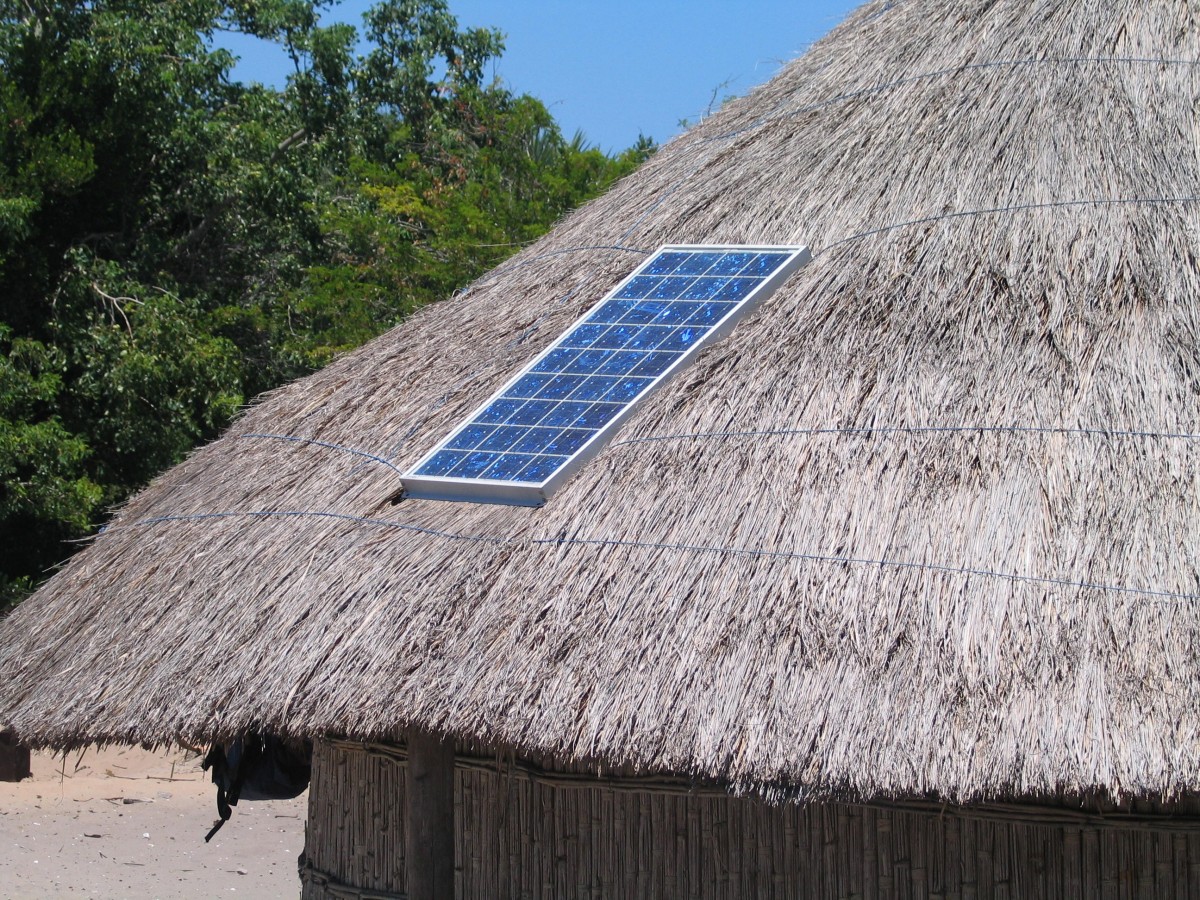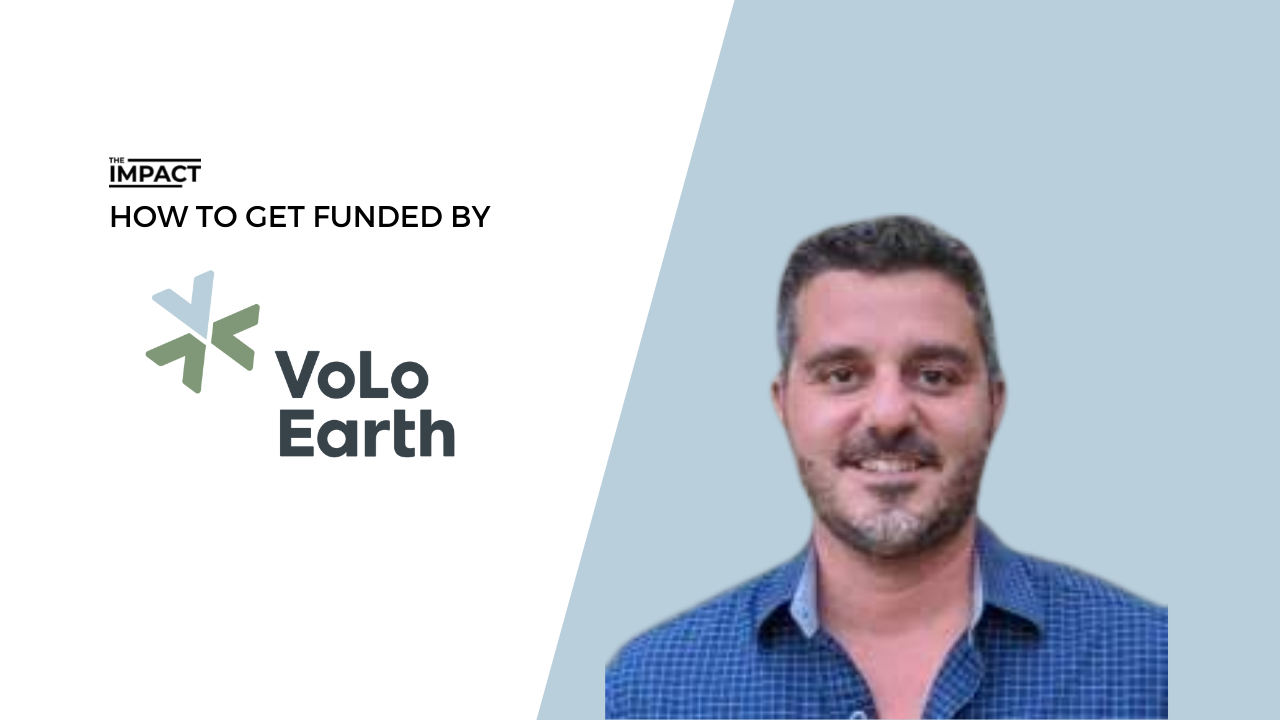🤔 If plants are so good at filtering air, why don’t we just take a bunch of leaves and make that our NATURAL mask…
We’re are geniuses over here at The Impact.
THE TL;DR 💨
☀️ The Power of Not-For-Profits to Drive Solar Deployments in Africa
- Value of not-for-profits in Africa solar
- Comparison of two not-for-profits (associations) in the space
- Services provided to members of the associations
- Impact of not-for-profits in climate change and energy inequity in Africa
💰 Decarbonize the Economy One Startup at a Time
- VoLo Earth Ventures is investing in early-stage climate tech companies that are focused on profitable decarbonization
- VoLo Earth focuses on the R&D phase and the go-to-market of the products, technologies, and companies it invests in.
⚡ ENERGY INEQUITY
The Power of Not-For-Profits to Drive Solar Deployments in Africa
By Brian Corn • is a senior software technology veteran focused in the clean-tech space looking to help educate and elucidate others on the state of climate change and related solutions.

It’s become clear that the road to energy equity and carbon emissions reduction for sub-Saharan Africa runs through broad-scale deployment of resilient, off-grid solar systems. We have looked at the ability of international investment via debt financing to cover some of the distance of this journey.
Not-for-profits (industry associations) represent another vehicle tracking significant mileage within the distributed solar space.
Enter GOGLA and AMDA:
GOGLA (Global Off-Grid Lighting Association) is an association focused on off-grid solar products. We spoke with Koen Peters (Executive Director) to better understand GOGLA’s story and impact.
AMDA (Africa Minigrid Developers Association) is a trade association representing mini-grid developers in the sub-Saharan Africa region. Joan Chahenza (Director of Energy Access and Financial Advisory) and Emmanuella Ngororano (Communications Associate) provided us with more details regarding AMDA and its impact.
How do associations play a part in African solar?
While international investment plays a critical part in the deployment of distributed solar in sub-Saharan Africa, financial resources are only part of the need. The off-grid market would also profit from policy change, advocacy and other services to improve the overall business climate for these products and help educate market participants. Trade associations focused on the off-grid industry can play this role.
Koen explained that GOGLA’s goal, as “The Voice of the Off-Grid Solar Energy Industry,” is to create a sustainable off-grid solar products market where companies can cultivate self-sufficiency via their own profits and efforts. While he believes in philanthropy, Koen is concerned that such funds, if focused on giving away products rather than building a sustainable market, can dilute the efforts of companies acting responsibly to solve common hurdles in the sector. GOGLA seeks to provide services to complement existing financial resources and thus augment their impact.
GOGLA serves its 200+ members mostly in East Africa and Southeast Asia. Members within the sub-Saharan Africa region are selling 7-8 million products annually. While GOGLA members include some of the biggest players in the sector (d.light, Bboxx, and Greenlight Planet, to name a few), most of their members are significantly smaller in terms of annual revenue. About 85% of industry members report annual revenues less than $5M with 70% reporting annual revenues less than $1M.
Examples of current products promoted by the association are 20 to 50-watt solar panels (compared to traditionally larger panels which are around 300-watt), as well as shoe-box sized and larger batteries to provide storage for night-time energy use. Innovations by members include the integration of mobile devices and IoT-enabled solar panels. This allows for effective and inexpensive payments to be made via mobile banking by customers with little to no prior credit history. This tight integration creates incentives for timely payments, as solar panels can also be turned off via the IoT component, and aligns well with GOGLA’s goal to develop the self-sufficiency of its members.
By comparison, AMDA was founded on a simple, yet bold idea: to unify the private sector, to be able to quickly electrify rural and peri-urban communities using decentralized renewable energy systems. This notion is what brings private sector mini-grid developers together. AMDA brings this idea to life through a vision of “universal energy access by 2030 using least cost, fastest technologies.” The organization supports the businesses implementing rural electrification in Sub-Saharan Africa, effectively the operators, who in turn provide reliable electricity to more than 500,000 households and MSMEs in rural and peri-urban communities. Joan characterizes the organization as more of a think tank than a traditional trade association, solving problems on the ground unique to each country. AMDA represents the voice of the mini-grid industry, promoting growth and sustainable development of the sector, as well as policies that help scale.
Joan noted that the mini-grid space is nascent compared to larger C&I (commercial and industrial) and even home solar systems, and thus requires a legal and financial landscape that enables scale. AMDA’s 39 private mini-grid developers across 17 countries are faced with many of the same challenges as solar products companies – lack of regulatory and policy frameworks, lack of flow of concessional financing, and lack of clarity on tariffs.
What are the services offered by these associations?
Koen noted that GOGLA hosts the Global Off-Grid Solar Forum and Exhibition, the premier event for the industry in sub-Saharan Africa. This presents an opportunity for off-grid solar product companies to show off their products, network with potential investors, and learn from others in the industry. This event demonstrates the strong advocacy arm at GOGLA which also works to ensure appropriate, responsible (not heavy-handed) regulations are implemented to address product quality standards, performance, and labor protections.
GOGLA also works with funders and investors within the industry to grow commercial finance separate and distinct from impact investment. He noted that the industry is not yet seeing consistent profits to encourage commercial investment. However, Koen believes his organization’s advocacy efforts, coupled with competent results from smaller members, will turn the tides. This also involves working with governments to understand the correct level of subsidies required to help product companies serve customers.
Joan described the three arms of AMDA – financing; policy and regulation; and data analytics – as the value proposition to its members. On the finance front, AMDA envisions an environment in which long-term debt can flow into the mini-grid developers space with appropriate de-risking in place. In partnership with other organizations such as the World Bank, the African Development Bank, and several DFIs, AMDA works to promote the flow of concessionary capital which will unlock private capital and enable the mini-grid market to scale.
Regarding policy and regulatory impact, Joan described advocating for optimal policies that benefit the mini-grid industry and those served by it. Chief among activities here include AMDA’s efforts to ensure additional subsidies are made available to the mini-grid market, as the rural electrification across the globe has always relied on some form of subsidies.
Through deep data analytics, AMDA provides a platform for transparency of data to help highlight and address barriers to mini-grid sector growth. For example, AMDA provides an annual benchmarking report which breaks out country-level operation cost differences between the utility grid and mini -rid. This information helps to educate donors and policymakers on the nuances within the mini-grid market.
What are the outcomes of these associations?
Koen noted that the most impactful activity for smaller GOGLA members is the organizing of events for the industry. By comparison, larger members benefit from GOGLA’s advocacy that seeks to ensure proper regulation seeks to ensure proper government regulation.
As GOGLA members can pay as much as $15K per year, Koen sees the number of membership renewals as evidence of the value proposition for the organization to its industry. This represents skin in the game that acts to move the ball forward for all off-grid solar players.
A specific example of an advocacy win was GOGLA’s success, jointly with other market stakeholders, in convincing the Kenyan government to reinstate VAT exemption on renewable energy products to help lower the cost of these products to consumers. Koen also pointed to GOGLA’s efforts during the COVID-19 pandemic to designate off-grid solar as an essential service such that sales agents could service customers as necessary.
Joan noted that AMDA currently serves as the chair of the Mini-Grids Partnership group. AMDA was part of the team supporting and providing responses for the Energy Access Relief Fund to provide the renewable energy sector support during COVID-19. AMDA has also been instrumental in establishing the Universal Energy Facility, managed by Sustainable Energy For All (SEForALL), a results-based finance fund accessible by mini-grid deployers across sub-Saharan Africa.
AMDA also joined GOGLA and other organizations in advocating for the same removal of VAT tax on solar products noted previously in this article. In her official statement, Joan said “the VAT exemptions in the 2021 Finance bill will catalyze investments in the renewable energy sector and scale up the solar Minigrid market in the country. These initiatives will contribute to the acceleration of Kenya’s SDG 7, energy access objectives, through the deployment of least cost Minigrid technology.” This reversal also represents an upstream cost reduction for AMDA’s members.
From a big picture perspective, Joan sees AMDA supporting its members’ communities by linking mini-grids to productive use which in turn serves to transform socioeconomic status. In particular, she notes how allowing women to earn a livelihood through access to reliable solar power and products is driving this transformation.
What is next for GOGLA?
Koen noted that the next bi-annual Global Off-Grid Solar Forum and Exhibition is the main focus for GOGLA in the immediate future. This event is of particular importance as the previous event was somewhat interrupted due to COVID-19. The current iteration will take place in Kigali, Rwanda in October 2022.
GOGLA will be issuing its Global Off-Grid Solar Market Report later this year to present sales and impact information for the industry.
Koen pointed to the recent launch of and continued effort to support the Power 1 Billion Lives Compact with its goal of providing clean, reliable energy for 1 billion people by 2030. This initiative supports the SDG 7 goal of “access to affordable, reliable, sustainable and modern energy for all.”
What is next for AMDA?
Joan mentioned that the next benchmarking report for the mini-grid developers industry should be available in the next month or so. This report aims to describe the current state of the sector, its opportunities, and challenges to growth, and how it has responded to the global disruptions resulting from the COVID-19 pandemic. It also offers insights for all stakeholders, from mini-grid developers to policymakers, that provide guidance on the issues still hindering the sector’s growth, such as consumption, financing, licensing, and support given to new inexperienced developers.
In addition, AMDA continues to work with donors and financiers to ensure that there is an increase in the flow of concessionary financing within the mini-grid market; per the Mini-Grid Funders Group as of March 2020, only 13% of over $2B allocated to the mini-grid market has been disbursed. The flow of concessionary financing is crucial in ensuring scale and in catalyzing and unlocking of private capital within the mini-grid market.
AMDA is working closely with governments to ensure regulatory and policy frameworks that embrace portfolio applications which enable a reduction in the amount of time it takes to achieve regulatory compliance.
Finally, AMDA continues to work with financiers and donors to ensure that Viability Gap Funds and results-based financing programs are structured in an optimal manner and are reflective of the realities of mini-grid developers in Sub-Saharan Africa.
Up Next…
The next article in this series will focus on local companies addressing the long tail of the distributed solar industry in sub-Saharan Africa and how they are making an impact to reduce carbon emissions and improve the state of energy inequity.
Sign up for The Impact and discover climate startups & opportunities before it hits the front page
💸 VC DEEP DIVE
Decarbonize the Economy One Startup at a Time
By Daniel Kriozere • is a Principal at C3, Tech Scout at For ClimateTech, and Venture Scout at Prithvi - and has an extensive network within the broader climate investment and startup community

VoLo Earth Ventures (VoLo Earth) is investing in early-stage climate tech companies that are focused on profitable decarbonization and are ready to commercialize and be deployed into the market this decade.
Fund Snapshot
- Stage: Pre-seed – Series A
- Check Size: $250K – 5M
- Fund Size: $100M cap (fundraising still open)
- Geography: Mainly North America with strategic external investments
- Lead/Follow: Lead or follow
About the Fund
Why was the fund created?
VoLo Earth Ventures launched with their first fund in 2020, via an anchor investment from David Vogel, the CEO of Voloridge Investment Management. David is also actively involved with the Rocky Mountain Institute (RMI). The fund also welcomes numerous strategic LPs in the space and an institutional investment from Credit Suisse.
VoLo Earth Ventures’ mission is to decarbonize the economy and the climate this decade, by addressing mitigation at its roots through technology. VoLo Earth believes in capitalism as a mechanism for change and that decarbonization is now a signal for economic growth and investment return.
What is a contrarian idea the VoLo Earth believes to be true/accurate?
VoLo Earth believes that there is enough existing technology to decarbonize and enable the new energy economy, one that is sustainable, equitable, and profitable to humans and our planet. Embedded in this, VoLo does not think that carbon capture is the biggest investment opportunity of the decade (nor geo-engineering our atmosphere/planet, nor “sustainable” rocketry, nor terraforming other planets).
The team members at VoLo are capitalists, not just venture capitalists. They believe that investment turns innovation. If products can compete on economic merit, they will win, and products that decarbonize will provide superior investment returns.
What domains in climate tech does your firm have the greatest expertise in?
From Joe and Kareem’s time in leadership roles in the electricity practice at RMI, as well as nearly 2 decades a piece working in the new energy economy and building startups of their own, VoLo Earth has expertise in the clean energy system, mainly focusing on electricity and its core end uses – mobility, buildings, and industry.
What type of portfolio support does VoLo Earth provide?
Because the team has strong backgrounds in technology and engineering, as well as product launch, go-to-market, and growing companies, VoLo Earth focuses on the R&D phase and the go-to-market of the products, technologies, and companies it invests in. Other pieces VoLo Earth can help with, given their large and strategic team, include:
- Strategy
- Governance
- Network
- Company growth
- ESG
- DEI
- Impact quantification
- M&A
- Legal and IP
About Investments
What is VoLo Earth’s investment process and timeline?
VoLo Earth is first and foremost adaptable, dynamic, and works with founders to ensure a collaborative approach that fits within their investment philosophy. If the fit is there, VoLo Earth puts flexibility at the forefront and works towards a fair and transparent process with founders. On average, VoLo Earth may typically take 2-3 months to get to know a founding team (sometimes longer) and have a number of calls (>5) covering tech, product, go-to-market, commercialization, financials/revenue plan, and other topics. VoLo Earth then does 1-2 customer/client calls, as well as a few calls in network with relevant personnel as sounding boards on the potential investment. VoLo Earth then has a full review of additional info in the data room, sometimes before and sometimes after a term sheet depending on if they are leading or not. This is all paired with VoLo Earth’s successful internal relative value matrix analysis coupled with a quantitative portfolio construction model. At the end of the day, fit within our investment thesis is first and foremost, as well as founder quality, commitment, and vision.
What would make VoLo Earth consider deviating from your typical criteria?
VoLo Earth stays firm on assessing economic merit and profitable decarbonization this decade. However, if hard-pressed, the answer could be an incredible founding team that convinced us that our criteria and methodology had good reason to be deviated from.
☕ CONSIDERING A WAY TO SUPPORT US?
Consider donating if you found this newsletter useful. These dollars are used to support The Impact and our writers as we continue to produce research and insights in the space.
✍️ WANT TO HELP US IMPROVE?
How would you feel if you could no longer receive The Impact?
Editors: Stephanie Zulman, Swarnav S Pujari Writers: Daniel Kriozere, Brian Corn
If you aren’t absolutely thrilled with The Impact, reply and let us know why. Or you can unsubscribe from all updates by clicking here.
Copyright © The Impact 2021. All Rights Reserved || 19 Morris Ave, Bldg 128, Brooklyn NY 11205

